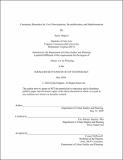Community remedies for civic disorientation, de-mobilization, and malinformation
Author(s)
Halpern, Dylan(Dylan Christopher)
Download1193556254-MIT.pdf (2.136Mb)
Other Contributors
Massachusetts Institute of Technology. Department of Urban Studies and Planning.
Advisor
Eric Robsky Huntley.
Terms of use
Metadata
Show full item recordAbstract
Mis- and disinformation pose serious challenges to civic engagement and democratic processes. Recent developments in our understanding of "network propaganda" in media ecosystems suggest the need for novel community-based techniques with which to resist the negative impacts of mis- and disinformation. Civic engagement and civic life have long been central concerns of urban planning as a community of practice. The ability of broad publics to participate and engage is currently challenged by disorientation (confusion through overwhelming or contradictory messages), de-mobilization (persuasion to abstain from civic action), and malinformation (mis- or disinformation). This thesis confronts these urgent challenges in partnership with MassVote, a Boston-based non-profit that conducts civic engagement and education efforts. Through engaging high school interns participating in MassVote's Young Civic Leaders program, I developed a workshop framework to equip high school-aged youth to build online and create healthier relationships with news media. Informed by feminist epistemology, I identify opportunities for individuals and communities to remain grounded, oriented, and resilient in the context of a troubled media ecosystem. The workshop templates operate at three scales: individual/perception, community/small-scale network, and citizenry/society. Together, they create a suite of engagement strategies towards a framework of "network citizenship," or a more resolutely situated participation in social networks, both online and off. Keywords; Disinformation, misinformation, civic engagement, community resilience, bottom-up techniques, Strong Objectivity
Description
Thesis: M.C.P., Massachusetts Institute of Technology, Department of Urban Studies and Planning, May, 2020 Cataloged from the official PDF of thesis. Includes bibliographical references (pages 89-93).
Date issued
2020Department
Massachusetts Institute of Technology. Department of Urban Studies and PlanningPublisher
Massachusetts Institute of Technology
Keywords
Urban Studies and Planning.